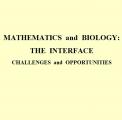
Voting, Arbitration & Fair Division: Mathematics of Social Choice
by Marcus Pivato
Publisher: Trent University 2007
Number of pages: 181
Description:
An introduction to social choice theory, which uses mathematics to study the strengths/weaknesses of voting systems, arbitration schemes, and other methods of group decision making. Lots of pictures, requires only basic linear algebra.
Download or read it online for free here:
Download link
(3MB, PDF)
Similar books
 Mathematics and Biology: The Interface, Challenges, and Opportunities
Mathematics and Biology: The Interface, Challenges, and Opportunitiesby Simon A. Levin
This report explores the interface between biology and mathematics. It argues that the stimulation of biological application will enrich the discipline of mathematics for decades or more, as have applications from the physical sciences in the past.
(18758 views)
 A Mathematics Primer for Physics Graduate Students
A Mathematics Primer for Physics Graduate Studentsby Andrew E. Blechman
The author summarizes most of the more advanced mathematical trickery seen in electrodynamics and quantum mechanics in simple and friendly terms with examples. Mathematical tools such as tensors or differential forms are covered in this text.
(24568 views)
 Inside Out: Inverse Problems and Applications
Inside Out: Inverse Problems and Applicationsby Gunther Uhlmann - Cambridge University Press
In this book, experts in the theoretical and applied aspects of inverse problems offer extended surveys on important topics in the field, such as microlocal analysis, reflection seismology, tomography, inverse scattering, and X-ray transforms.
(13797 views)
 Computational Modeling and Mathematics Applied to the Physical Sciences
Computational Modeling and Mathematics Applied to the Physical Sciences- National Academy Press
We examine several deep theoretical problems, including turbulence and combustion. At the frontiers of attack on these problems we discover the limitations imposed by our current understanding of model formulation and computational capability.
(7343 views)